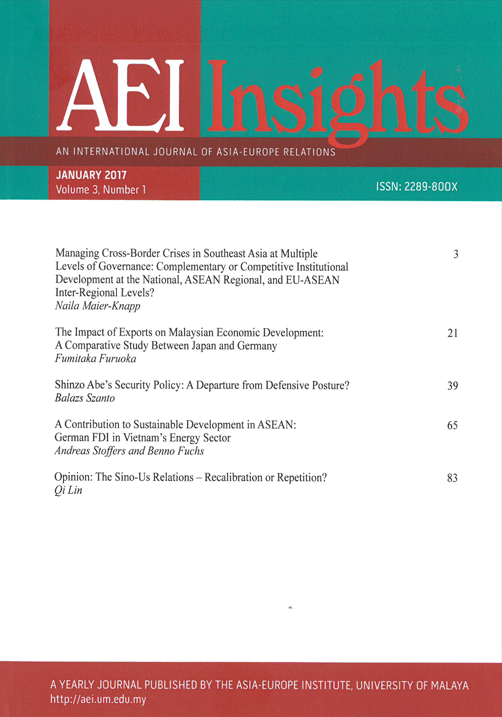Managing Cross-Border Crises in Southeast Asia at Multiple Levels of Governance: Complementary or Competitive Institutional Development at The National, ASEAN Regional, And EU-ASEAN Inter-Regional Levels?
Naila Maier-Knapp - Albert-Ludwigs University Freiburg, Germany
The Impact of Exports on Malaysian Economic Development: A Comparative Study between Japan and Germany
Fumitaka Furuoka - Asia-Europe Institute, University of Malaya, Malaysia
Shinzo Abe’s Security Policy: A Departure from Defensive Posture?
Balazs Szanto - Dept. of International & Strategic Studies, University of Malaya, Malaysia
A Contribution to Sustainable Development in ASEAN: German FDI in Vietnam's Energy Sector
Andreas Stoffers and Benno Fuchs - University of Applied Languages / SDI Munich, Germany
[Opinion] The Sino-Us Relations – Recalibration or Repetition?
Qi Lin - Elliott School of International Affairs, George Washington University, USA
Naila Maier-Knapp is a sessional lecturer at the Albert-Ludwigs University of Freiburg in Germany. She takes research interest in regionalism and inter-regionalism of the EU and ASEAN in connection to cross-border challenges of the 21st century and has published widely on this, including the first-ever book on this topic- Southeast Asia and the European Union: non-traditional security crises and cooperation published by Routledge in 2014.
Fumitaka Furuoka is a visiting Senior Research Fellow at the Asia-Europe Institute, University of Malaya. He was an Associate Professor at the School of Business and Economics, University of Malaysia, Sabah and has taught economics at University of Malaysia, Sarawak. Before joining academia, he was a senior assistant, Consulate-General, Japan, in Penang, from 1991 to 1999. His main interests include comparative studies of Asian and European economic development, and Japanese studies.
Andreas Stoffers studied political science and economics with a focus on International Relations and completed his PhD on German – Thai relations. Andreas has many years of practical management experience at Deutsche Bank AG (1996-2014). During this time, he was a long-time member of Deutsche Bank AG Vietnam Executive Board. In 2014, Andreas was the co-founder of the consulting firm ASEAN Business Partners GmbH and became Full Professor for International Management at the University for Applied Languages SDI in Munich. His many contacts in Southeast Asia, especially in Thailand, Vietnam and Malaysia, and his publications qualify him as an expert on the entire ASEAN region.
Benno Fuchs, M.A., studied translation studies and intercultural business communication at the University of Applied Languages SDI in Munich. At first, his research was focused mainly on intercultural problems of Vietnamese immigrants in Germany. His focus has now shifted to German investments in the Vietnamese energy market in recent years. While working for the European Institute of ASEAN Studies as a Junior Researcher, he is currently doing his PhD in supply chain management in the Vietnamese biomass sector. Benno has already established relevant contacts to the major players in the German-Vietnamese energy sector.
Balazs Szanto is a PhD candidate with the University of Malaya in Kuala Lumpur, Malaysia. His current research primarily focuses on various maritime issues in Northeast and Southeast Asia, as well as on how the rise of China as a regional power affects the security environment of Asia.
Qi Lin, a MA candidate of the George Washington University, Elliott School of International Affairs. Her research focus is on cross-Pacific security and Asian studies, particularly on the Sino-U.S. relations and on the foreign policy and politics of these two.
Editor-in-Chief
Prof. Dr. Azirah Binti Hashim, Executive Director, AEI
Managing Editor
Dr. Sameer Kumar, Senior Lecturer, AEI
Editorial Board members
Prof. Dr. Moses Samuel, Deputy Executive Director (Academic), AEI
Prof. Dr. Patrick Tim Ziegenhain, Visiting Professor, AEI
Datuk Dr. Norma Mansor, Professor, Faculty of Economics and Administration, University of Malaya
Assoc. Prof. Dr. Jatswan S. Sidhu, Department of International and Strategic Studies, University of Malaya
Assoc. Prof. Dr. Fumitaka Furuoka, Senior Research Fellow (Visiting), AEI
Dr. Roy Anthony Rogers, Senior Lecturer, Department of International and Strategic Studies, Faculty of Arts and Social Sciences, University of Malaya
International Advisory Board
Prof. Dr. T. J. Pempel, University of California, Berkeley, California, USA
Prof. Emeritus Dr. Wilfrido V. Villacorta, De La Salle University, The Philippines
Prof. Dr. Aileen San Pablo-Baviera, University of the Philippines, The Philippines
Prof. Anthony Milner, Visiting Professor, AEI
Prof. Dr. Rajendra K. Jain, School of International Studies, Jawaharlal Nehru University, India
Prof. Dr. Alfredo C. Robles Jr., Professor of International Studies, College of Liberal Arts, De La Salle University, The Philippines
Assoc. Prof. Dr. Sebastian Bersick, School of International Relations and Public Affairs, Fudan University, Shanghai, People’s Republic of China
Editorial Co-ordinator
Timotheus J. Krahl, Research Assistant, AEI
Contact Information
Editor-in-Chief, AEI-Insights
Asia-Europe Institute
University of Malaya
50603 Kuala Lumpur, Malaysia
Fax: +603 7954 0799
Tel: +603 7967 4645/ 6921/ 6931
Email: aei.insights@um.edu.my
Website: https://aei.um.edu.my/
(Forthcoming in AEI Insights: An International Journal of Asia-Europe Relations. Due for publication in January 2019, Vol 5, Issue 1)
In:
Maier-Knapp, N. (2017). Managing Cross-border Crises in Southeast Asia at Multiple Levels of Governance: Complementary or competitive institutional developments at the national, ASEAN regional and EU-ASEAN inter-regional levels? AEI Insights: An International Journal of Asia-Europe Relations, 3(1), 3-20.
 AEI Insights Vol.3, Number 1 (2017)
AEI Insights Vol.3, Number 1 (2017)Last Update: 15/11/2023